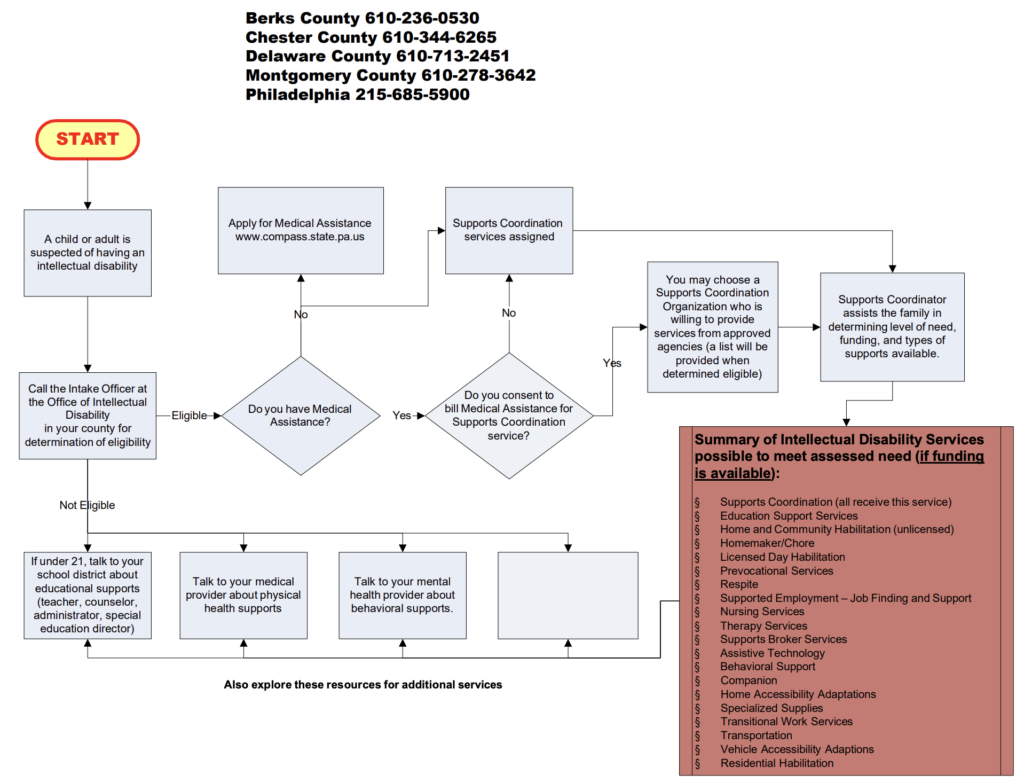HCBS Services
HCBS Provider offers a comprehensive range of support options designed around the specific needs of our consumers. This includes companion, respite, habilitation, supported employment, and behavioral health. These services are available under the Consolidated and P/FDS waivers through the Office of Developmental Programs (ODP), Adult Autism waiver as well as the OBRA waiver through the Office of Long Term Living (OLTL).
Behavioral Support
Behavioral Support is a direct and indirect service that includes a comprehensive assessment; the development of strategies to support the participant based upon the assessment; and the provision of interventions and training to participants, staff, parents, and caregivers. Services willbe provided to meet the current needs of the participants, as documented and authorized in the service plan.
Community Participation Support
Provides opportunities and support for community inclusion and build interest in and developing skills and potential for competitive-integrated employment. Services should result in active, valued participation in a broad range of integrated activities that build on the participant's interests, preferences, gifts, and strengths while reflecting his or her desired outcomes related to employment, community involvement, and membership. The intent is to flexibly wrap around or otherwise support community life secondary to employment, as a primary goal. This service involves participation in integrated community settings, in activities that involve people without disabilities who do not receive or unpaid caregivers.
Companion Services
Companion services are direct services provided to participants aged eighteen and older who live in private homes for the limited purposes of providing supervision or assistance that is designed to ensure the participant’s health, safety, and welfare or to perform activities of daily living for the participant. This service is intended to assist the individual to participate more meaningfully in home and community life. This service may be provided in home and community settings, including the participant’s competitive employment workplace. Companions may supervise, assist, or even perform activities for a participant that include grooming, household care, meal preparation and planning, ambulating, medication administration in accordance with regulatory guidance, and socialization. This service can be used for hours when the participant is sleeping and needs supervision and/or assistance with tasks that do not require continual assistance, or non-habilitative care to protect the safety of the participant. This service can also be used to supervise participants during socialization or non-habilitative activities when necessary to ensure the participant’s safety.
In-Home and Community Support
This is a direct service provided in home and community settings to assist participants in acquiring, maintaining, and improving the skills necessary to live in the community, to live more independently, and to participate meaningfully in community life. To the extent that In-Home and Community Support is provided in community settings, the settings must be inclusive rather than segregated. Services consist of assistance, support, and guidance (physical assistance, instruction, prompting, modeling, and reinforcement) in the general areas of self-care, health maintenance, decision making, home management, managing personal resources, communication, mobility and transportation, relationship development and socialization, personal adjustment, participating in community functions and activities, and use of community resources.
Respite Services
These are direct services that are provided to supervise and support participants living in private homes on a short-term basis for planned or emergency situations, giving the person(s) normally providing care a period of relief that may be scheduled or due to an emergency.
Supported Employment Services are direct and indirect services that are provided in a variety of community settings for the purpose of supporting participants in obtaining and sustaining competitive-integrated employment. Competitive-integrated employment refers to full or part-time work at minimum wage or higher, with wages and benefits like workers without disabilities performing the same work and fully integrated with coworkers without disabilities.
Supported Employment Services
These services include activities such as training and additional support including worksite orientation, job aide development, coordination of accommodations, and ensuring assistive technology that may be needed by the participant to obtain and sustain competitive-integrated employment is utilized as specified in the plan.
Career Assessment
Career assessment is a person-centered, individualized employment assessment used to assist in the identification of potential career options, including self-employment, based upon the interests and strengths of the participant. Career assessment may include discovery activities. Career assessment may be provided in a residential habilitation service setting as appropriate and should be on a time-limited basis.
Job Finding or Development
Job Finding or Development includes employer outreach and orientation, job searching, job development, resume preparation, and interview assistance. Other activities may include participation in individual planning for employment, development of job-seeking skills, development of job skills specific to a job being sought, job analysis, consulting with OVR, benefits counseling agencies, or Ticket to Work employment networks on behalf of a participant, or self-employment assistance. Job Finding or Development may be provided in a residential habilitation service setting as appropriate.
Job Coaching and Support
Job Coaching and Support consists of training the participant on job assignments, periodic follow-up, or ongoing support with participants and their employers. This may include systematic instruction. The service must be necessary for participants to maintain acceptable job performance and work habits, including assistance in learning new work assignments, maintaining job skills, and achieving performance expectations of the employer.

